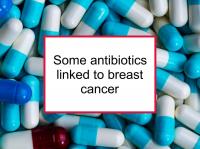Studies concerning the link between antibiotic use and breast cancer risk have reported inconsistent results. Such studies are difficult to perform since the prescription and cancer databases that normally are used are typically not able to provide adequate data concerning other known breast cancer risk factors.
It is possible that the use of antibiotics simply reflects health deficits such as chronic inflammation, chronic infection, or a weakened immune system that in themselves increase breast cancer risk.
Nevertheless, available evidence suggests that some antibiotics might promote breast cancer in some women. Now a large new study has reported that breast cancer risk is modestly increased by exposure to TMP/SMX antibiotic drugs such as Bactrim or Septra. The same study reported stronger associations between antibiotic use and risks of gastrointestinal malignancies and lung cancer.
How antibiotics could influence breast cancer risk
Several explanations have been proposed for the possible connection between antibiotic use and breast cancer. Antibiotics affect multiple organs, not just the bacteria they are intended to combat. Antibiotics reduce the diversity of intestinal microflora and may interfere with the ability of such microflora to metabolize plant phytochemicals into compounds that protect against cancer.
Antibiotic use also affects the immune system and inflammation in ways that may increase breast cancer risk. In addition, antibiotics have been shown to disturb bone metabolism, with unknown effects on the potential to develop bone metastases.
There is also evidence that antibiotics may affect breast tissue directly. Breast tumor tissue and paired normal adjacent tissue from the same woman have been found to contain different types and levels of bacteria. The total bacterial DNA load has also been found to be reduced in tumor versus paired normal tissue. In addition, one study reported that the mammary glands of mice treated with antibiotics had more numerous and more developed terminal ductal lobular units than untreated control mice.
Antibiotics that have been associated with increased BC risk
The following antibiotics and antifungals have been found to be associated with increased breast cancer rates in at least one study:
- Cipro (ciprofloxacin)
- Flagyl (metronidazole)
- Garamycin (gentamicin)
- Grisovin (griseofulvin)
- TMP/SMX drugs such as Bactrim or Septra (trimethoprim plus sulfamethoxazole, aka cotrimoxazole)
- Tetracyclines such as Sumycin, Terramycin, Tetracyn, and Panmycin.
Avoiding these antibiotics would not solve the problem for breast cancer survivors since some studies have increased risk for antibiotic exposure generally without specifying particular brands or classes of antibiotics.
In addition, different studies link different antibiotics to breast cancer risk, which makes it hard to justify specific recommendations. Food is also a source of antibiotic exposure. For example, Cipro has been found in chicken meat and tetracyclines in milk, farmed fish and shellfish.
In fact, antibiotics are necessary to treat serious infections, which could be life threatening otherwise. Women should continue to follow the prevailing medical advice to limit antibiotic use to when it is strictly medically necessary and to complete any course of antibiotics once it has been started. Generally speaking, topical antibiotics (if effective for a given condition) are preferable to oral antibiotics.
Latest research finds breast cancer risk linked to TMP/SMX
The case-control study referenced at the beginning of this news story was designed to investigate the possible association between antibiotic use and cancer risk. The authors noted that bacterial dysbiosis (microbial imbalance) has been found in human tumors. In addition, tumor susceptibility has been transmitted from animal to animal using fecal transplantation. To conduct the study, the authors used a large medical records database to identify cases of 16 common cancers. Cases diagnosed before age 20 or part of known familial cancer syndromes were excluded from the study. Four controls matched based on age, sex, location, and duration of follow-up were assigned for comparison to each cancer case. A total of147,604 cases and 577,048 matched controls were included in the study. Exposure of interest was antibiotic use more than one year before diagnosis.
Breast cancer risk was found to be modestly associated with exposure to TMP/SMX (trimethoprim/sulfamethoxazole or cotrimoxazole). Regarding gastrointestinal malignancies, use of penicillin was associated with higher risks of esophageal, stomach, colorectal and pancreatic cancers. The higher the number of courses of antibiotics, the stronger the association—the risk of stomach cancer was 43% higher among those who had used more than five courses of penicillin compared to controls.
Lung cancer risk was found to be elevated with use of penicillin, cephalosporines, and macrolides (44% higher risk for more than five courses of penicillin). The risk of prostate cancer was found to be modestly higher with the use of penicillin, quinolones, TMP/SMX and tetracyclines. As the authors expected, no link was found between antibiotic use and melanoma or carcinoma of the cervix. In addition, no association was found between cancer risk and use antiviral and anti-fungal drugs.
The authors conclude that recurrent exposure to certain antibiotics may be associated with increased cancer risk in certain organs.
Please see our article on antibiotics for more information.
